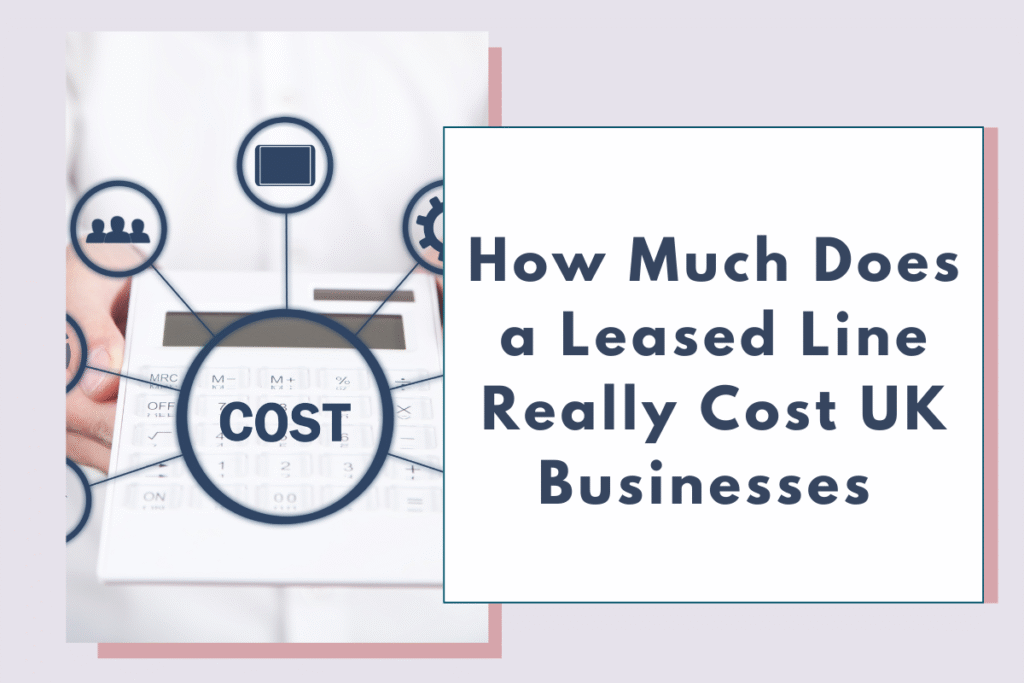You probably know already that having super fast, reliable internet can give your business a strong competitive advantage, and for UK businesses, leased lines remain one of the most robust connectivity options available, offering guaranteed speeds, uncontended bandwidth, and enterprise-grade SLAs.
But how much does a leased line really cost in the UK today?
Pricing can vary significantly depending on speed, location, and provider, which makes it essential for SMEs and larger organisations alike to understand the full picture.
Join us as in this guide, we’ll break down leased line costs, including installation charges, monthly fees, and the factors that impact ongoing business internet pricing.

What Is a Leased Line?
A leased line is a type of internet connection that is fully dedicated to your business, and is also uncontended (making it unique from regular business broadband), meaning your business does not share bandwidth with others. Leased lines also provide symmetrical speeds, upload and download rates are the same, making them ideal for cloud-based businesses, video conferencing, and remote team support.
With guaranteed uptime through Service Level Agreements (SLAs) and rapid fix times, leased lines are considered the gold standard for business connectivity.
Average Leased Line Costs in the UK
The cost of a leased line has fallen steadily over the past decade, thanks to increased competition and expanding full-fibre networks. Here’s a breakdown of typical pricing:
Speed | Average Monthly Cost | Typical Use Case |
100Mbps | £200 – £300 | Small SMEs with cloud use, VoIP, video calls |
500Mbps | £300 – £500 | Medium-sized businesses, multiple users, high data use |
1Gbps | £400 – £700 | Larger SMEs, multi-site offices, heavy cloud workloads |
10Gbps | £900+ | Enterprises with data-intensive operations |
💡 remember that prices vary depending on your business location – for example, leased lines in London and major cities are often cheaper due to network density, while rural locations can face higher costs.
Installation Charges
One of the biggest questions you may ask when choosing your business internet is: “Do I need to pay for leased line installation?”
- Standard installation: Many providers now offer free installation if you commit to a 3-year contract!
- Non-standard installation: If additional civil engineering is required (e.g. digging trenches for fibre), you may face excess construction charges (ECCs). These can range from a few hundred pounds to several thousand depending on the complexity.
- Lead times: Installation typically takes 45–90 working days, depending on existing infrastructure and wayleave agreements.
Factors That Affect Leased Line Pricing
When comparing leased line costs, we want to highlight several factors influence the total price:
1. Speed & bandwidth
Higher bandwidth means higher monthly costs, and (from our experience/clients), many SMEs find 500Mbps to 1Gbps more than sufficient for current needs.
2. Location
Urban areas benefit from established fibre infrastructure, while rural sites may require more extensive work, thus raising your costs.
3. Contract length
Most providers offer discounts on 3- or 5-year contracts, and shorter 12-month contracts tend to be significantly more expensive.
4. Service Level Agreement (SLA)
Premium SLAs with guaranteed 4-hour fix times can cost more, but for mission-critical businesses, trust us… they do provide peace of mind.
5. Additional features
- Managed routers
- Firewall security
- Backup connections
- These add-ons can increase costs but enhance reliability.
UK Providers Pricing Snapshots
Here’s a quick look at some well-known UK leased line providers and their latest offerings:
Provider | Leased Line Pricing (from) | Key Features |
| £250 per month | Nationwide coverage, 24/7 support, scalable speeds |
| £230 per month | Competitive SME packages, strong city presence |
| £220 per month | Cost-effective, flexible contracts |
| £240 per month | Cloud-ready connectivity, strong slas |
| £260 per month | High customer service ratings, trusted SME provider |
Is a Leased Line Worth the Cost?
The higher price tag of leased lines often raises the question: is it worth it compared to fibre broadband?
For businesses that rely heavily on:
- Cloud-based applications
- VoIP and video conferencing
- Remote and hybrid working
- Large file transfers or data backups
- Customer-facing digital platforms
…the answer is usually yes!! The productivity gained from uncontended speeds, reliability, and guaranteed uptime often outweighs the higher monthly cost.
Ways to Reduce Leased Line Costs
- Compare multiple providers – Competition has increased, so don’t settle for the first quote.
- Commit to a longer contract – 36- or 60-month contracts often include free installation.
- Check for government schemes – Some regions still offer gigabit vouchers to offset installation costs.
- Consider aggregated bandwidth – Some SMEs share leased line capacity across multiple sites for cost efficiency.
Our Final Thoughts
Leased line costs in the UK are more affordable than ever, but they remain a premium business internet solution, and we expect SMEs can expect to pay £200–£700 per month depending on speed and location, with installation often free on longer contracts.
So we think that if your business relies on reliable, high-speed, symmetrical connectivity, the investment in a leased line could deliver substantial returns through reduced downtime, faster collaboration, and future-proof performance.
Before deciding, weigh up your organisation’s digital needs against the cost difference and you will be saving in no time!







